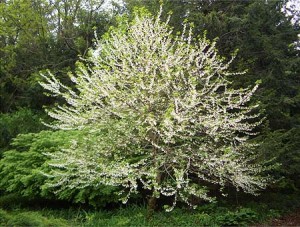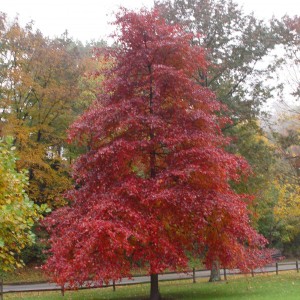Nearly 50 Trees Distributed Through Spring 2016 Reforestation Project
MWCA distributed nearly 50 trees to Magnolia Woods residents through the Spring 2016 Reforestation Project. Participants chose from an expanded list of native, storm resilient trees that ranged from towering giants to understory specimens and also included some fruiting trees.
Recipients were encouraged to plant their trees as soon as possible to give them the best possible chance to establish their root systems before the heat of summer. “We have had a surprisingly cool and pleasant spring with a good amount of rain so far,” says Reforestation Coordinator Jim Wilkins, “but it will no doubt be getting hot soon and newly planted trees suffer extra stress in hot, dry weather.” Wilkins points out that it is important to give your tree enough water but not too much because it is possible to drown a tree. Trees do better when planted level with or about an inch above ground level: “Plant it high and it won’t die” as the saying goes.
Wilkins encourages all residents with new trees—including Reforestation participants—to follow the LSU AgCenter’s recommendations for planting trees as outlined in The Native Tree Growing Guide for Louisiana.”
Only storm-resilient native trees are available through the Reforestation Project. Native trees are typically resistant to insect pests and diseases found in this locale, and many also serve as hosts to desirable insects and fauna. The selection this year included American Beech, Bald Cypress, Dahoon Holly, Live Oak, Long Leaf Pine, Mayhaw, native Persimmon, Silverbell, Red Buckeye (a butterfly host), Savannah Holly, Sourwood, Southern Magnolia, Southern Sugar Maple, Swamp Red Maple, Sweet Bay Magnolia, Tulip Poplar, and White Oak. Japanese Magnolia (also known as Saucer Magnolia) are no longer distributed because they have found to be insect-prone.
The reforestation project is intended to beautify our neighborhood and increase property values. It is made possible by the Magnolia Woods Civic Association members’ dues. If you are a member of the Association we greatly appreciate your participation. If you are not a member please consider joining. The reforestation project is only one of the efforts conducted by the MWCA that aim to keep our neighborhood one of the best places to live in Baton Rouge.




